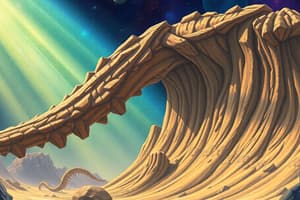Podcast
Questions and Answers
Which era does the Mesozoic Era follow?
Which era does the Mesozoic Era follow?
- Neolithic Era
- Cenozoic Era
- Paleozoic Era (correct)
- Mesolithic Era
What geological event marked the end of the Cretaceous Period?
What geological event marked the end of the Cretaceous Period?
- Formation of the Atlantic Ocean
- Extensive volcanism
- Breakup of Pangaea
- Impact from large asteroid or comet (correct)
Which group of animals dominated during the Mesozoic Era?
Which group of animals dominated during the Mesozoic Era?
- Insects
- Mammals
- Amphibians
- Dinosaurs (correct)
What is significant about the K-T boundary in geological terms?
What is significant about the K-T boundary in geological terms?
Which climatic condition did reptiles in the Mesozoic Era readily adapt to?
Which climatic condition did reptiles in the Mesozoic Era readily adapt to?
What was one possible hypothesis for the mass extinction event at the end of the Mesozoic Era?
What was one possible hypothesis for the mass extinction event at the end of the Mesozoic Era?
During which geological era did the Mesozoic Era occur?
During which geological era did the Mesozoic Era occur?
Which period of the Mesozoic Era is known for the dominance of dinosaurs?
Which period of the Mesozoic Era is known for the dominance of dinosaurs?
During the Cretaceous Period, which group of organisms became extinct due to a mass extinction event?
During the Cretaceous Period, which group of organisms became extinct due to a mass extinction event?
Which of the following events marked the end of the Triassic Period and the beginning of the Jurassic Period?
Which of the following events marked the end of the Triassic Period and the beginning of the Jurassic Period?
Which period saw the breakup of the supercontinent Pangaea, leading to the separation of major landmasses?
Which period saw the breakup of the supercontinent Pangaea, leading to the separation of major landmasses?
What was a characteristic feature of marine life during the Permian Period?
What was a characteristic feature of marine life during the Permian Period?
During the Permian Period, what major event led to a significant percentage of marine and land species going extinct?
During the Permian Period, what major event led to a significant percentage of marine and land species going extinct?
What is the significance of the Mesozoic Era in the context of vertebrate evolution?
What is the significance of the Mesozoic Era in the context of vertebrate evolution?
Which characteristic marks the Jurassic Period within the Mesozoic Era?
Which characteristic marks the Jurassic Period within the Mesozoic Era?
What is a notable feature of the Triassic Period within the Mesozoic Era?
What is a notable feature of the Triassic Period within the Mesozoic Era?
How did fluctuations in sea level during the Paleozoic Era impact climate and geography?
How did fluctuations in sea level during the Paleozoic Era impact climate and geography?
Flashcards are hidden until you start studying
Study Notes
Mesozoic Era
- Spans ~ 180 million years from 248 Ma to 65 Ma
- Divided into three periods: Triassic, Jurassic, and Cretaceous
- Often called the "age of reptiles"
- Began with much of the world's land above sea level
- Seas invaded western North America
- Breakup of Pangaea began, forming the Atlantic Ocean
- Subduction of oceanic crust produced widespread deformation, volcanism, and mountain building along the Western coast
- Mountains of western North America began forming
Mesozoic Life
- Survivors of the great Paleozoic extinction: true pines, redwoods, flowering plants, insects, and reptiles
- Reptiles adapted to the dry Mesozoic climate
- Dinosaurs dominated
- One group of reptiles led to the birds
- Many reptile groups and other animal groups became extinct at the close of the Mesozoic
Mesozoic Extinction
- Possible hypotheses: impact from large asteroid or comet, extensive volcanism
- KT Boundary (Cretaceous–Tertiary boundary) marks the end of the Cretaceous Period
- Associated with a mass extinction that destroyed a majority of the world's Mesozoic species, including all dinosaurs except for birds
Paleozoic Era
- Each period had changes in life forms, tectonics, and sea level
- Shallow seas covered the continents, and marine life flourished
- Changing sea levels contributed to diversification of life forms
Cambrian Period (543-490 Ma)
- "Cambrian explosion" – great diversity of life forms evolved during this time
- Hard-bodied organisms evolved, with the ability to secrete calcium carbonate and calcium phosphate for formation of an outer skeleton
Ordovician Period (490-443 Ma)
- Abundant and diverse marine life, including emergence of vertebrates (e.g., jawless fishes)
- Surge in rate of extinctions
- Many landmasses converged to form the southern continent of Gondwanaland
Silurian Period (443-417 Ma)
- Supercontinent of Gondwanaland near the South Pole
- Ancestral North America and Europe began converging and were situated near the equator
- Rise in sea level
- Reefs created closed basins with evaporation and evaporite deposits
- Terrestrial life: plants, scorpions, and millipedes
Devonian Period (417-354 Ma)
- Gondwanaland completely formed in the Southern Hemisphere
- North America and Eurasia joined as the continent of Laurasia in the Northern Hemisphere
- Devonian known as the "age of fishes"
- Two groups of bony fishes: lung fish and lobe-finned fish, which evolved to become the amphibians
Carboniferous Period (354-290 Ma)
- Collision of Gondwanaland with Laurasia
- Formation of the Appalachian Mountains and Ural Mountains
- Warm, moist climate
- Dense swamplands and present-day coal beds
- Insects and amniote egg
Permian Period (290-248 Ma)
- Amniote vertebrates continued to diversify
- Ancestral link to reptiles and mammals
- Permian extinction: ~95% of all marine species and ~70% of all land species
- Possible causes of extinction: redistribution of water and land, changes in landmass elevations, climate change, and lowering of sea levels
Studying That Suits You
Use AI to generate personalized quizzes and flashcards to suit your learning preferences.




